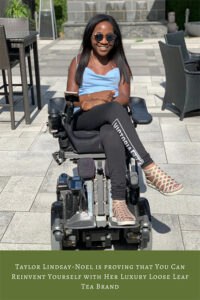
When Taylor Lindsay-Noel reviews a restaurant, she’s not just commenting on the food and the ambiance — though that’s a part of it.
The Toronto tea entrepreneur is making waves with her TikTok reviews that rate restaurants on their wheelchair accessibility on a one-to-five scale.
That means asking questions like, can she actually get through the doors? Is there a push button to open and close the doors? Are the bathroom sinks low enough for her to reach?
“When you’re navigating the restaurant itself, it’s really important that there is enough space to move around, and also evaluating how the staff treat you,” Lindsay-Noel said.
“The washrooms are typically where things go very sideways.”
For Lindsay-Noel, going out for a bite to eat is a lot of work. That’s why she says it’s so important that restaurants get this stuff right.
It can take her some time to get ready. She usually has to call a taxi. And before anything else, she has to do her research.
She says she never just shows up at a place expecting her needs to be accommodated. She only hits up restaurants that bill themselves as wheelchair accessible online. Oftentimes, she’ll even call to double check.
She’s learned that just because an establishment calls itself accessible, doesn’t mean it actually is.
“Sometimes a restaurant might think wheelchair accessible means that you can access the front door with a wheelchair. But after you move in, then it’s a disaster,” she said. “So I think that’s why the video component of what I do has made such an impact.”
Take, for example, one of her most viral videos — a one-out-of-five accessibility rating for Toronto’s Shameful Tiki Room.
The Polynesian-themed joint bills itself as wheelchair accessible online, and Lindsay-Noel says she also called ahead to confirm. But when she took her friend there for her birthday, she discovered that while she could get through the front door, a step blocked her from entering the bathroom.
“I had to then pay for another ride, change my plans and figure everything out, which really derails your entire day,” she said. “[It] is so inconvenient, when it [the restaurant] could just be honest about the fact that the place wasn’t accessible.”
“I hope it leads to what is already happening — real change. Places are updating their listings,” she said.
“It feels … like we’re a last thought, and that people don’t really consider the fact that lying about accessibility to make yourself look better has a really big effect on someone’s mental health,” she said.
Lindsay-Noel first started using a wheelchair after being paralyzed in a gymnastics fall when she was 14. In those early days after the accident, she says a bad experience at a restaurant was enough to keep her cooped up at home for weeks on end.
“I was too scared to run into issues,” she said. “So I can really empathize with people who are, especially, newly injured, who are navigating the world for the first time in a different body, how troublesome going out can be.”
She has more restaurant reviews in the works, and plans to expand her repertoire by travelling and rating the accessibility of transportation and hotels.
“The opportunities, I think, are kind of endless and it really does hopefully help everyone because accessibility affects everybody,” she said.


